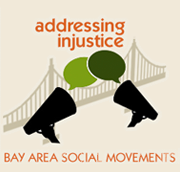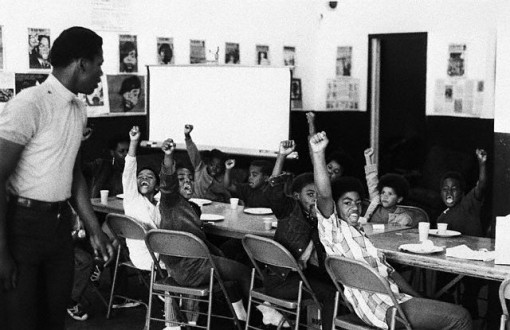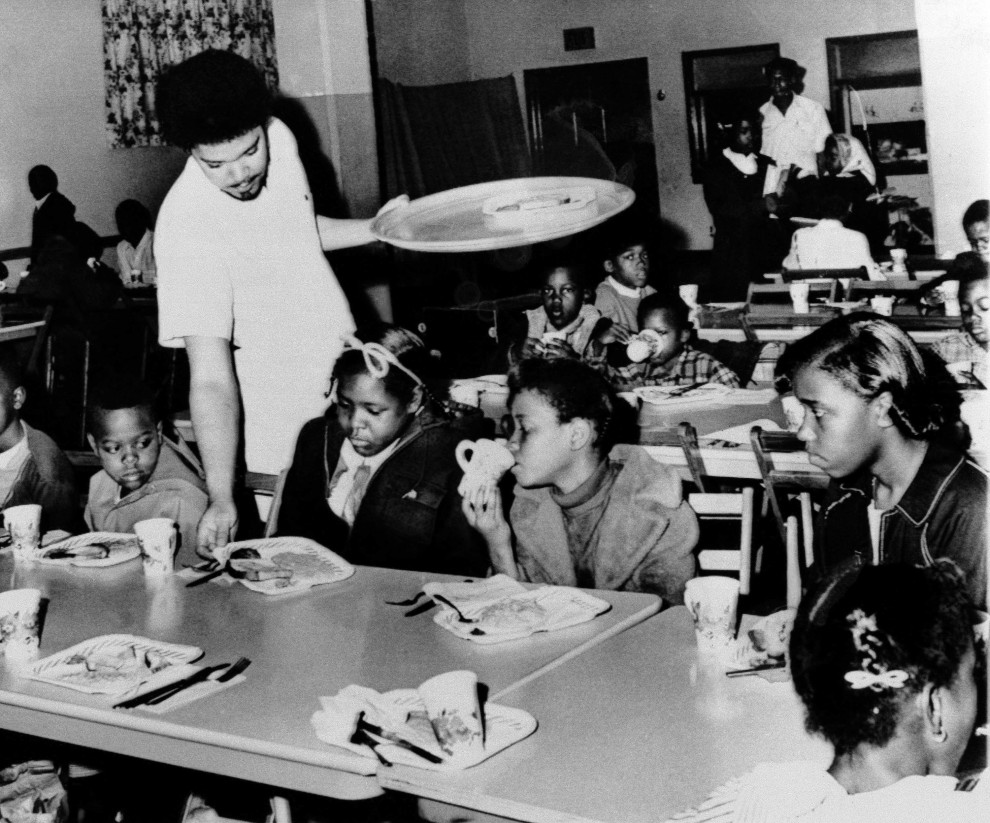Black Panther Party’s Free Breakfast for Children Program
Historical Essay
By Nadia Kim
Children raising their hands in solidarity for Black Liberation and Empowerment

| The Black Panther Party for Self-Defense was established in 1966 to challenge police brutality and build community self-determination. To meet its basic needs, the Black Panther Party (BPP) created dozens of “Survival Programs Pending Revolution” including the “The Free Breakfast for Children Program” (FBB). This program formulated a radical anti-hunger politics and became the most successful and nationally visible BPP program. |
In October 1966 Huey Newton and Bobby Seale founded the “Black Panther Party for Self-Defense” in West Oakland in response to the rise of police violence against the Black community.[1] They emphasized the urgent need for the Black community to rally against and defend themselves from racist police oppression and state power by “policing the police”. By the late 1960s the focus of the Black Panther Party shifted from that of armed militancy and self-defense to incorporate a commitment to actively organize, educate, and politicize the Black community by addressing their immediate material needs. Various social programs, or “Survival Programs” were created by the BPP in order to advance its radical political agenda [2].
Bill Whitfield serving free breakfast to children in April 1969
Photo: William P. Straeter
In January 1969 Bobby Seale launched the first Free Breakfast for Children Program at Father Earl A. Neil’s St. Augustine Episcopal Church in West Oakland, CA. Father Earl A. Neil was a veteran of the civil rights movement in Mississippi and encouraged other ministers to open their church doors to host community survival programs.[3] The breakfasts consisted of bread, bacon, eggs, grits, and orange juice and relied on the support of community volunteers.[4] On the first day Party members fed 11 children, and numbers quickly rose to 140 children fed by the end of that week.[5]
The Free Breakfast for Children Program (FBP) had two primary roles: 1) it alleviated the hunger that affected children’s ability to function and to learn; (2) it also served as an organizing tool to start discussions about capitalism, racism, and the possibility of revolutionary change with both youth and adults.[6] The FBP was promoted as a “self-defense against hunger” and provided sustenance to bolster children’s ability and confidence to fully engage in academic institutions that undervalued and underfunded resources for Black schoolchildren.[7]
Expanding Beyond Oakland
After seeing the effects in Oakland, Seale implemented FBP in about 45 chapters with some chapters organizing at multiple sites. National coordinator of FBP, Joan Kelly, claimed that by November of 1969 approximately twenty thousand children were being served by 22 branches and chapters throughout the United States. [8] [9] By 1972 the FBP had been adopted by parent-teacher associations, churches, and local governments across the country.[10]
Not only did the FBP seek to provide sustenance to help schoolchildren focus in the classroom but it also worked to empower the children on a political level. Some centers conducted informal classes on African American history as well as political educational discussions centered around the “true conditions of Blacks in racist America.”[11] These discussions focused on educating the children on the history of the oppressed as well as the racist and classist nature of American society. By educating the youth, the Panthers ultimately sought to expand the children’s political consciousness to imagine a more revolutionary reality built upon resistance and liberation.
As a grassroots initiative the BPP encouraged community members to donate both resources and time. On any given day there were more non-Panthers working than Panthers at many FBP sites.[12] All of the survival programs were intended to serve as models that were initiated by the Party but would eventually be assumed and run by community members. Sufi Burkari, a former BPP member, recalled the FBP as “one of the most valuable programs, and anyone could get involved, you did not have to be a member, at first I wasn’t.”[13] In fact many of the volunteers were mothers and grandmothers who played a large role in the daily delivery and service of the FBP. According to Elaine Brown, the former chairperson of the BPP, the FBP also worked to shift the stringent gender roles within the Party. She said:
“The Breakfast Program represented the beginning of breakdown within the party ranks of the roles between men and women… This is not a man’s thing, so this was a very big dividing line issue ... the most amazing part was that everybody accepted it. You could have a thousand dialogues on gender issues and you would have never gotten that result faster than you did by saying look, if you love these children, if you love your people, you better get your ass up and start working in that breakfast program.”[14]
While the labor required to prepare and serve the food was voluntary, securing foods and other resources often involved outsourcing from local entities. Until at least 1971 the BPP had a standing policy that refused to accept government funding of any kind to sustain the program.[15] Instead the FBP was entirely received food, material, and cash donations from and funded by individuals, businesses, and organizations. Often BPP members obtained food by soliciting local supermarkets. They framed those who refused to donate as “avaricious businessman” who had little regard for the community and perpetuated hunger by overcharging for food items.[16] This outlook stood directly in line with the BPP’s political stance against capitalism and fostered an ideology on hunger that was predicated on the claim that capitalism caused people’s suffering. Instead public pressure was placed upon local businesses through the Party’s newspaper as well as through boycotts. The BPP newspaper listed names of stores whose owners refused to donate and urged readers to boycott those businesses and “challenge capitalists who profited from the community without giving back”.[17]
One major business that consistently refused to donate to the FBP was Safeway, the largest grocery store chain in the West Coast.[18] Once Panther leaders realized that the BPP and the United Farm Workers (UFW) shared a common enemy, the BPP became one of the most vocal and active supporters of the UFW boycott against Safeway. Under the guidance of Bobby Seale, the BPP launched a campaign which would encourage shoppers to boycott Safeway and offer free transportation to shop at Lucky’s grocery stores, which donated to the FBP. The UFW’s alliance with the BPP in the Safeway boycott proved fruitful when the Safeway store located at 27th Street and West Street in Oakland was forced to close due to their efforts. The alliance between the UFW and the BPP strengthened the collective force of the boycott enabling its success.[19]
Footage of the Black Panther Party Free Breakfast for School Children Program at San Francisco's Sacred Heart Church at Fillmore and Fell Street [no sound]. Outtakes and b-roll footage believed to be taken as part of the California Newsreel film May Day Panther a.k.a. May Day (Newsreel #29)
Video: © African American Museum and Library at Oakland
State Repression
According to the San Francisco’s Field Office of the Federal Bureau of Investigation (FBI), the FBP was considered one of the most dangerous programs of the BPP largely due to the scope of its success. It was primarily targeted due to its “potentially successful effort…to teach children to hate police and spread ‘anti-white propaganda’.”[20] Federal officials claimed that the FBP was a “cover” for the “violent nature” of the BPP.[21] Finding it difficult to directly criticize and contest the radical social work of the BPP, the FBI director at the time, J. Edgar Hoover, worked to criminalize and discredit the Panthers' activities and ultimately to destroy the organization completely.
In order to dissuade support for the BPP, the FBI’s Counterintelligence Program (COINTELPRO) employed various covert and overt actions in attempts to label the BPP as “criminal” and to link their efforts to criminal activity.[22] The actions ranged from accusing the group of extortion, harassing church leaders and members who hosted the daily meals, intimidating and pressuring local church officials, store owners, and landlords into denying the use of their facilities, disseminating false propaganda against the BPP to withdraw local support, and outright raiding FBP sites and destroying food facilities and items as well as kitchen equipment.[23] The claims of extortion likely stemmed from the Bureau’s belief that business contributions, whether legitimate or not, to the BPP programs could not have been voluntary.[24] Despite COINTELPRO's failed attempt to reveal evidenced criminal activity within the FBP, the program was ultimately dismantled by the FBI. It is widely accepted that the strength of the program contributed to the 1975 adoption by the Federal government of a breakfast program for children.
The Legacy of the Free Breakfast Program on Food Justice
By providing necessary services the programs intentionally created and sustained a platform to underline the injustices produced by American capitalism. They shed light on how the federal government consistently refused to address the prevalent poverty in Black communities and justified this refusal by incessantly criminalizing poor urban Black folks. Meeting the needs of the community was a concrete means of raising consciousness and building a political base to resist the hegemonic repression of the American government and its capitalist interests. Overall the survival programs functioned as a tool to recruit community members to revolt against the American government and materialize a new society separate from capitalism and institutional racism.
The direct action politics of the FBP functioned as both the “model for, and impetus behind, all federally funded school breakfast programs currently in existence within the United States”.[25] The state felt politically pressured by the FBP’s success and approved the permanent authorization of the SBP. Not only did the FBP bring attention to state failures but it also manifested an emancipatory political agenda rooted in direct action that was committed to serving those living on society’s margins. It was this political vision that inspired “survival pending revolution” and fueled “the possibility of a different tomorrow after surviving today.”[26]
Beyond the institutional legacy that the FBP shaped, the Panthers’ grassroots food access initiative greatly influenced the present-day food justice movement. The Panthers, who conceptualized food justice “as a site of conscious and concerted social activism”, offered a new framework to critically question the intersections between racial equality and social justice and understand the Black freedom struggle.[27] Their survival programs laid the groundwork to organize and uplift communities to elevate their consciousness and to establish coalitions among disparate groups. Today many food justice groups and organizations, especially in the Bay Area, resonate with many of the BPP’s critiques of racism and capitalism. As David Hilliard, the former Panther Chief of Staff, said, “food is a very basic necessity, and it’s the stuff that revolutions are made of.”[28]
Notes:
[1] Paul Alkebulan, Survival Pending Revolution: The History of the Black Panther Party (Tuscaloosa, AL: The University of Alabama Press, 2007), 11.
[2] Alkebulan, 41.
[3] Alkebulan, 123.
[4] Raj Patel, Survival Pending Revolution: What the Black Panthers Can Teach the US Food Movement (Institute for Food and Development Policy, 18(2), 2012), 2.
[5] Nik Heynen, Bending the Bars of Empire from Every Ghetto for Survival: The Black Panther Party’s Radical Antihunger Politics of Social Reproduction and Scale (Georgia: Annals of the Association of American Geographers, 99.2, 2009), 407.
[6] Garrett Broad, “The Black Panther Party: A Food Justice Story,” The Huffington Post, October 6, 2016, (accessed December 10, 2016).
[7] Ricky J. Pope and Flanagan, Shawn T., "Revolution for Breakfast: Intersections of Activism, Service, and Violence in the Black Panther Party's Community Services Programs", Social Justice Research 26(4), 459.
[8] Alkebulan, 32.
[9] Heynen, 407.
[10] Lauren Araiza, ”In Common Struggle against a Common Oppression”: The United Farm Workers and the Black Panther Party, 1968-1973 (The Journal of African American History, 94.2, 2009), 208.
[11] Kit Holder, The History of the Black Panther Party, 1966-1971: A Curriculum Tool for African-American Studies, (University of Massachusetts Amherst: ProQuest Dissertations Publishing, 1990), 43.
[12] Holder, 94.
[13] Holder, 87.
[14] Heynen, 411.
[15] Holder, 91.
[16] Potori, 46.
[17] Potori, 46.
[18] Araiza, 204.
[19] Araiza, 210.
[20] Joy Ann Williamson, "The Black Panther Party’s Educational Programs". Counterpoints, Vol. 237, 2005, 135.
[21] Huey Newton, War Against the Panthers: A Study of Repression in America (UC Santa Cruz: Doctoral Dissertation, 1980).
[22] Ibid.
[23] Potori, 46.
[24] Newton.
[25] Heynen, 406.
[26] Patel, 3.
[27] Potori, 45.
[28] Garrett Broad, “The Black Panther Party: A Food Justice Story,” The Huffington Post, October 6, 2016, (accessed December 10, 2016).


